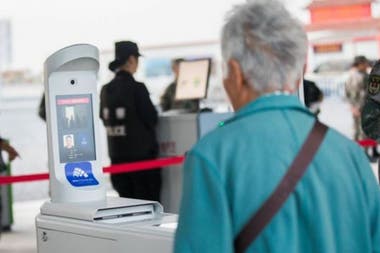China has been tightening the rules for years to ensure that everyone who uses the Internet does so under their real identity
From now on, who hires new
mobile phone services
in
China
will have to go through a facial scan, a new measure that causes controversy in the Asian giant.
The government says that with the measure, with which they seek to verify the identities of the hundreds of millions of users of
Internet
of the country, wants to "protect the legitimate rights and interests of citizens in cyberspace."
The regulation, announced in September, entered into force this Sunday.
China, which is the world leader in facial recognition technology, already uses this tool to survey its population, but its intensive use throughout the country in recent years has generated an intense debate around the
privacy in the digital age
.
What are the new rules?
 There is a growing opposition against China's widespread adoption of facial recognition technology
There is a growing opposition against China's widespread adoption of facial recognition technology
When subscribing to new cell phone or mobile data contracts, customers in China already had to show their national identification card (as required in many countries) and take photos.
But now, they also scan their faces to verify that it matches the identification provided.
For years, China has been tightening the rules to ensure that everyone who uses the Internet does so under their real identity.
In 2017, for example, new rules established that Internet platforms should verify the identity of a user before allowing them to publish online content.
The new regulation for telecommunications operators was defined by the Ministry of Industry and Information Technology as a way to "strengthen" this system and ensure that the government can identify all cell phone users.
Most Chinese Internet users access the web through their
phones
.
Jeffrey Ding, a Chinese artificial intelligence researcher at the University of Oxford, said that one of China's motivations to get rid of phone numbers is to increase cyber security and reduce network fraud.
But another probable motivation, he said, is to better track the population: "It is connected to a very centralized impulse to try to monitor everyone, or that is, at least, the ambition."
Are people worried?
 China will have 400 security cameras on its streets by 2020
China will have 400 security cameras on its streets by 2020
When the regulations were announced in September, the Chinese media did not give much impact.
But on the Internet, hundreds of social network users expressed concern about the increasing amount of data the government has about them.
"People are being monitored more and more strictly," said a user of the Sina Weibo microblogging website. "What are they afraid of (in government)?"
"This is being implemented without the public's consent," criticized another.
But others simply said that the measure was in line with "technological progress."
China already censures and controls the web widely, eliminating and blocking content that it does not want its citizens to speak and see.
How widespread is facial recognition in China?
 Facial recognition is becoming increasingly part of everyday life and business transactions in China
Facial recognition is becoming increasingly part of everyday life and business transactions in China
China is often described as a surveillance State: in 2017 it had 170 million security cameras throughout the country with the goal of installing approximately another 400 million by 2020.
The country also has a system of
"social credit" to maintain a score on the behavior and public interactions of all its citizens in a single database.
The goal is that, by 2020, everyone in China will enroll in a vast national database that compiles fiscal and government information to give each citizen a "rating."
Facial recognition plays a key role
in the surveillance system and has been praised as a way to catch fugitives.
Last year, according to several media outlets, the police were able to identify a fugitive in the middle of a crowd of 60,000 people during a concert thanks to technology.
But in the western region of Xinjiang, where up to a million Uighur Muslims and other ethnic minorities have been detained for what authorities call "reeducation," surveillance cameras use facial recognition to specifically track Uyghurs, according to their appearance. ,
according to the New York Times published earlier this year.
Meanwhile, facial recognition is becoming increasingly part of everyday life and business transactions in China. It is increasingly used, for example, to pay in stores and supermarkets.
However, earlier this year, a university professor sued a park for forcing its visitors to go through facial recognition, which sparked a broader debate about the massive collection of state data about its citizens.
In September, the Chinese government said it planned to "curb and regulate" the use of facial recognition technology in schools after reports emerged that a university was trying to use it to monitor student attendance and behavior.
The Ding researcher said it was clear that there is a growing reaction against China's widespread adoption of facial recognition technology.
These critics often focus on fears of data theft, piracy and abuse by commercial companies, he said.
However, citizens are increasingly critical about how the Chinese government could exploit that data to track the population.
ADEMS
The controversy in China over the imposition of facial recognition to all cell phone buyers – LA NACION
